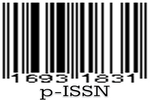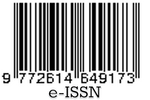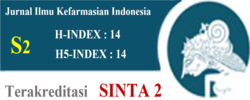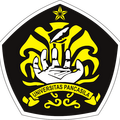Validation of A New Questionnaire Assessing Knowledge and Perceptions about Combination between Herbal and Conventional Medicine
Abstract
Indonesia is a country which has great potential of herbal medicine, although combination between herbal and conventional medicine can be benefi cial or harmful. Knowledge and perceptions about that combination are needed to achieve the best treatment eff ect. To validate a new instrument assessing knowledge and perceptions of patients about combination between herbal and conventional medicine. This study used cross sectional study which was conducted in some of pharmacy in Yogyakarta. Inclusion criterias of the subject were people who visited to the pharmacy with ages above 18 years old and below 65 years old, also had used the combination of herbal and conventional medicine for minimal a month to achieve the same goal of treatment. Items of the questionnaire were developed
by existing literatures and added some new items. The content validity had been conducted by some experts. Analysis statistic with bivariate correlations was used to determine the validity and reliability of the questionnaire. Subjects who met the inclusion criteria were 30 people, which are consisted of 15 of
healthy people and the rest are people who use the combination. In the domain of knowledge, there are 16 valid questions over 19 questions. Reliability had been calculated by 16 questions and it was reliable (cronbach alpha 0.863). In the perception domain, there were 8 valid questions. The reliability showed that the questions were reliable (cronbach alpha 0.862). There are 3 invalid questions because all of the answer is similar. Our study provides that this new questionnaire was valid and reliable to a ssessknowledge and perception of the patient who use combination of herbal and conventional medicine.
References
2. Desni F, Wib owo TA, Rosyidah. Hu bungan pengetahuan, sikap, perilaku kepala keluarga dengan pengambilan keputusan pengobatan tradisional di desa rambah tengah hilir Kecamatan Rambah Kabupaten Rokan Hulu Riau. Jurnal KESMAS UAD. 2011.5(3):162-232.
3. National Center for Complementary and Alternative Medicine, CAM Basic. National Institute of Health,U.S. Department of Health and Human Services. 2012.
4. National Center for Complementary and Intergrative Health, Complementary, alternative, or integrative Health : What’s In a Name. National Institute of Health, U.S. Department of Health and Human Services: 2016.
5. Patterson C, Arthur H. A complementary alternative medicine questionnaire for young adults. Integrative Medicine Insights. 2009.4:1-11.
6. Mokkink L B, Terwee CB, Patrick D L, Alonso J, Stratford PW, et al. The COSMIN checklist for assessing the methodological quality of studies on measurement properties of health status measurement instruments : an International Delphi Study. Qual Life Res. 2010.19:539-49.
7. Eisenberg D M, et al. Perceptions about complementary therapies relative to conventional therapies among adults who use both. National Survey Ann Intern Med. 2001.135:344-51.
8. Hamidah A, et al. Prevalence and parental perceptions of complementary and alternative medicine use by children with cancer in a multi-ethnic Southeast Asian Population. Pediatr Blood Cancer. 2009.52:70-4.
9. Goh SGK, Rusli BN, Khalid BAK. Development and validation of the Asian Diabetes Quality of Life (AsianDQOL) questionnaire. Diabetes Research And Clinical Practice. 2015.108:489-98.
10. Hidayati A, Perwitasari DA. Persepsi pengunjung apotek mengenai penggunaan obat bahan alam sebagai alternatif pengobatan di Kelurahan Muja Muju Kecamatan Umbulharjo Kota Yogyakarta. Home Care Proceeding. 2011:119-28.
11. Streiner DL, Norman GR. Health measurement scales: a practical guide to their development and use. New York: Oxford University Press; 1995.
12. Al-Qazaz HK, et al. The eight-item Morisky Medication Adherence Scale MMAS: translation and validation of the Malaysian version. Diabetes Res Clin Pract. 2010.90(2):216-21.
Licencing
All articles in Jurnal Ilmu Kefarmasian Indonesia are an open-access article, distributed under the terms of the Creative Commons Attribution-NonCommercial-ShareAlike 4.0 International License which permits unrestricted non-commercial used, distribution and reproduction in any medium.
This licence applies to Author(s) and Public Reader means that the users mays :
- SHARE:
copy and redistribute the article in any medium or format - ADAPT:
remix, transform, and build upon the article (eg.: to produce a new research work and, possibly, a new publication) - ALIKE:
If you remix, transform, or build upon the article, you must distribute your contributions under the same license as the original. - NO ADDITIONAL RESTRICTIONS:
You may not apply legal terms or technological measures that legally restrict others from doing anything the license permits.
It does however mean that when you use it you must:
- ATTRIBUTION: You must give appropriate credit to both the Author(s) and the journal, provide a link to the license, and indicate if changes were made. You may do so in any reasonable manner, but not in any way that suggests the licensor endorses you or your use.
You may not:
- NONCOMMERCIAL: You may not use the article for commercial purposes.
This work is licensed under a Creative Commons Attribution-NonCommercial-ShareAlike 4.0 International License.





 Tools
Tools





















